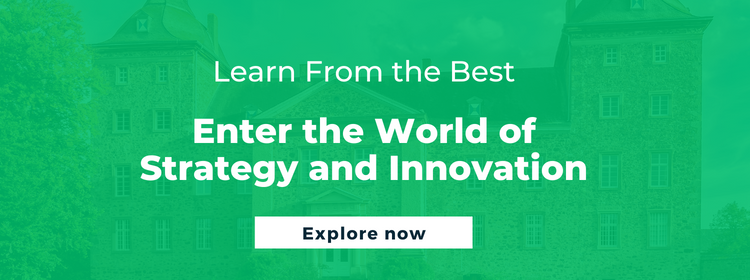How to Become a Strategy Consultant: Everything You Need to Know

- What is Strategy Consulting?
- What Qualifications and Skills are Needed to Become a Successful Strategy Consultant?
- How Can Networking Help Aspiring Strategy Consultants in Their Career?
- What are the Different Types of Strategy Consulting Roles Available in the Industry?
- What is the Average Strategy Consultant Salary?
- How Can Individuals Stay Informed About the Latest Trends and Developments in the Consulting Industry?
The need for a strategy consultant for companies has grown more important as they work to find their way through complicated market environments today. This job is not just about skilled professionals capable of dealing with different business problems. Given their rising demand, strategy consultants can also command good salaries. This has made the job an avenue worth exploring with many a professional now wanting to know how to become strategy consultant. This article delves deep into the role and all that it entails.
What is Strategy Consulting?
A vital part of the wider consulting field, strategy consulting focuses on objectively advising organizations when it comes to big decisions. Additionally, by using their industry understanding and analytical abilities, strategy consultants assist businesses in enhancing their performance through resolving current hurdles they may be facing as well as creating fresh and innovative methods for expansion. Therefore, at its core, strategy consulting is to bring about business transformation via strategic insight and recommendation.

What Qualifications and Skills are Needed to Become a Successful Strategy Consultant?
A. Qualifications
1. Bachelor’s or Master’s Degree
- A business administration degree is foundational in that it offers a broad understanding of business principles and practices, crucial for strategy consulting
- Finance or economics are specialized degrees that provide insights into market analysis and financial planning, beneficial for strategy analysis
- Engineering or science degrees are for consultants focusing on technical or industrial sectors as they offer an in-depth understanding of specific industries
2. Professional Certifications
- A management consulting certification validates consulting skills and knowledge, offering credibility in the consulting industry
- Industry-specific certifications related to specific industries, for example, in IT or health care, can enhance a consultant’s expertise in niche areas
B. Skills
1. Analytical and Problem-Solving Skills
These are essential for dissecting complex business issues and developing effective solutions.
2. Communication and Interpersonal Skills
These soft skills are crucial for building relationships with clients, understanding their needs, and conveying complex information clearly.
3. Strategic Thinking
The ability to foresee potential challenges and opportunities for the client’s business and advise accordingly is imperative for strategy consultants.
4. Adaptability and Flexibility
Adaptability helps professionals in this space to adjust strategies based on evolving business landscapes and client needs.
ALSO READ: What is Strategy? Choose the Best Approach for Business Growth
How Can Networking Help Aspiring Strategy Consultants in Their Career?
1. Gaining Industry Insights
Networking with experienced professionals can offer aspiring strategy consultants unparalleled insights into current industry trends and best practices. Furthermore, these interactions allow individuals to stay ahead of market shifts and emerging challenges within the consulting landscape. Additionally, seasoned consultants can share case studies and experiences that textbooks do not cover, providing a real-world perspective that is invaluable for anyone aiming to excel as a strategy consultant.
2. Mentorship Opportunities
Establishing connections with seasoned consultants can lead to mentorship opportunities, offering guidance and personalized advice for career progression. Mentorship can be particularly beneficial in navigating the complexities of the consulting field, from choosing specializations to understanding the nuances of client management. Mentors can also provide feedback on project approaches and strategies, thus accelerating the learning curve for new consultants.
3. Building Professional Relationships
Strong professional networks can lead to collaborations and partnerships that enhance business opportunities. These relationships are not only instrumental in securing new projects but can also provide a support system for solving complex problems. Additionally, a robust network can offer a competitive edge, as referrals from well-respected peers add credibility to one’s professional profile.
4. Learning About Job Openings
Many consulting positions are filled through referrals. Thus, a robust network can open doors to job opportunities. Moreover, being recommended by a respected professional can significantly enhance one’s chances of securing an interview. Informal meetings or industry events often lead to discussions about upcoming roles before they are publicly advertised, providing a strategic advantage in the job market.
5. Enhancing One’s Reputation
Active participation in professional groups and events can build your reputation in the consulting community. Furthermore, contributing insights and leading discussions can establish you as a thought leader in your area of expertise. A strong reputation facilitates introductions to key influencers and decision-makers, further enhancing career opportunities.
ALSO READ: Everything You Need to Know About Strategic Transformation
6. Access to Resources and Tools
Networking can provide access to exclusive resources, tools, and information beneficial for consultants. Moreover, sharing best practices and tools among peers can lead to more efficient and effective project outcomes. Access to proprietary databases or software through one’s network can offer a competitive edge in delivering strategic insights.
7. Skill Development
Engaging with a diverse group of professionals can foster skill development through workshops, seminars, and informal learning opportunities. Moreover, many professional associations offer courses and certifications that can be accessed through networking. Peer-to-peer learning and mentoring are also invaluable for developing both hard and soft skills crucial for a successful career in strategy consulting.
8. Industry Events
Attendance at industry events can broaden one’s perspective and understanding of the consulting market. These events provide a platform for learning about the latest industry trends, technological advancements, and management theories. Additionally, participating in panels or workshops can enhance one’s visibility and reputation within the consulting field.
9. Global Perspective
Often, networking takes on a global dimension as well, presenting opportunities to interact with professionals from various regions. This can provide a global outlook, which is important for international consulting roles. Understanding the nuances of different markets and cultures undoubtedly enhances a consultant’s ability to advise multinational corporations effectively. Another benefit is that global networking opportunities can lead to assignments in other countries, expanding one’s professional experience and exposure.
10. Feedback and Critique
Constructive feedback from peers and mentors in the network can help refine consulting approaches and methodologies. Receiving input from experienced consultants can lead to improvements in project execution and client satisfaction. A culture of open feedback thus fosters continuous learning and development, which is essential for career growth in strategy consulting.
ALSO READ: Is Mapping Consumer Insights the Secret to Surviving in a Competitive Market?

What are the Different Types of Strategy Consulting Roles Available in the Industry?
1. Corporate Strategy
Corporate strategy entails making critical, high-level decisions that define a company’s overarching goals and how it plans to achieve them, aiming to satisfy stakeholder expectations. This involves working intimately with senior management to ensure that the company’s strategic initiatives are in harmony with its mission and vision. Key areas of focus include scenario analysis, advising on mergers and acquisitions, and enhancing corporate governance practices to foster sustainable growth.
2. Business Strategy
Business strategy deals specifically with the strategic choices related to product selection, gaining a competitive advantage, and enhancing customer satisfaction. It involves detailed planning and execution in areas such as market analysis, competitive positioning, product development, and marketing strategies. The aim is to identify and exploit growth opportunities that align with the corporate strategy, thereby improving the business’s performance in the competitive marketplace and achieving targeted financial outcomes.
3. Operational Strategy
Helping organizations optimize their operations for efficiency and effectiveness, operational strategy consultants focus on enhancing the day-to-day activities of a business. Such consultants work on streamlining processes, reducing costs, and improving operational agility. Their role often involves implementing technology solutions and best practices to achieve operational excellence as well.
4. Financial Strategy
Guiding financial planning, investment decisions, and economic modeling, financial strategy consultants play a key role in ensuring the financial health of an organization. Moreover, they analyze financial data to identify opportunities for growth and risk mitigation. Their expertise is particularly crucial for companies looking to navigate financial challenges or capitalize on new market opportunities.
5. Digital Strategy
Assisting businesses in leveraging digital technologies for strategic advantage, digital strategy consultants are at the forefront of digital transformation. Moreover, they help organizations integrate digital tools and methodologies to improve customer engagement, operational efficiency, and innovation. Notably, their role is critical in guiding companies through the complexities of digital disruption.
ALSO READ: 10 Wrong Pricing Strategies That are Costing Your Brand Money
6. Marketing Strategy
Consultants in this space develop strategies to enhance market presence and customer engagement. Marketing strategy consultants specialize in understanding consumer behavior and market dynamics. They work on branding, positioning, and marketing mix strategies to increase market share and customer loyalty. Given their area of expertise, their insights into digital marketing trends and analytics are invaluable for crafting successful marketing campaigns.
7. Human Resources Strategy
With a focus on strategies, organizational development, and talent management, HR strategy consultants focus on maximizing employee performance and satisfaction. Moreover, they develop strategies for recruitment, retention, and development that align with the company’s overall objectives. They also work on culture and change management for organizations undergoing transformation.
8. Sustainability Strategy
This role is increasingly crucial in today’s environment, where stakeholders demand more responsible business practices. Sustainability strategy consultants, therefore, help companies develop sustainable business practices and Corporate Social Responsibility (CSR) initiatives. In fact, they are instrumental in integrating environmental and social considerations into business strategies. Additionally, they guide companies in sustainability reporting and compliance with environmental regulations.
9. Innovation Strategy
They focus on fostering innovation within organizations to drive growth. Innovation strategy consultants help companies identify and develop new products, services, and business models. Moreover, they create frameworks for innovation management and culture building that encourage creative thinking and agile response to market changes. Additionally, their expertise supports companies in staying competitive in rapidly evolving industries.
10. Global Strategy
Global strategy consultants advise companies on entering and succeeding in international markets. They navigate the complexities of global expansion, assessing market attractiveness, regulatory environments, and cross-cultural considerations to formulate entry and growth strategies. Their guidance is necessary for companies looking to leverage global supply chains, partnerships, and market opportunities.
ALSO READ: Make Sure Your Company’s Reskilling Efforts Pay Off
What is the Average Strategy Consultant Salary?
A strategy consultant can expect to earn an average annual remuneration of approximately $144,112. This average strategy consultant salary incorporates an average base salary of $86,500 annually. These statistics reflect the central value or median derived from our exclusive Total Pay Estimate model, which aggregates salary data submitted by our users. The supplementary compensation, which is anticipated to be about $57,612 per year, might consist of various forms of earnings such as bonuses, commissions, gratuities, and profit sharing.
ALSO READ: What is Strategic Planning? A Simple Guide
How Can Individuals Stay Informed About the Latest Trends and Developments in the Consulting Industry?
1. Subscribing to Industry Publications
Strategy consultants can significantly benefit from subscribing to leading industry publications. Furthermore, these resources provide in-depth analyses, case studies, and reports on the latest trends and challenges within the consulting sector. Additionally, regular engagement with such content can enhance a strategy consultant’s understanding of the market dynamics and client expectations. Thus, keeping abreast of publications is essential for those pondering how to become strategy consultant.
2. Joining Professional Associations
Joining professional associations relevant to strategy management consulting offers multiple advantages. Furthermore, these organizations often host conferences, workshops, and seminars that provide valuable learning opportunities. Also, they serve as a platform for networking with peers, sharing experiences, and discussing industry developments. Hence, membership in professional associations is a strategic move for any aspiring or established strategy consultant.
3. Attending Conferences and Seminars
This is a direct way to absorb the latest industry knowledge and trends. Such events, in fact, often feature presentations and talks by leading experts in strategy consulting, offering insights into new methodologies, tools, and approaches. They also provide a forum for debate and discussion on pressing issues facing the consulting industry. As such, participation in these events is highly beneficial for those aiming to elevate their career as a strategy consultant.
4. Enrolling in Continuing Education Courses
Enrolling in continuing education courses and certifications can play a pivotal role in a strategy consultant’s professional development. Moreover, these programs cover a range of topics, from advanced strategy management consulting techniques to emerging technologies impacting the consulting landscape. Acquiring new certifications can further enhance a strategy consultant resume, making it more attractive to clients and employers. Therefore, continuous learning is a key strategy for maintaining competitiveness in the field.
5. Leveraging Social Media and Online Forums
Lastly, leveraging social media and online forums offers strategy consultants a platform to stay connected with industry trends and ongoing peer discussions. Many experts and thought leaders share their insights and analyses online, providing a wealth of information accessible at the click of a button. Participating in online discussions can, therefore, raise a consultant’s profile and establish them as a knowledgeable professional in their field. Active engagement in social media and forums is advisable for any strategy consultant looking to keep pace with industry developments.
ALSO READ: Strategies for Sustainable Business: The Ultimate 4-Step Guide
In conclusion, embarking on a career as a strategy consultant requires a blend of education, skills, and networking. Furthermore, the field offers many opportunities for those willing to invest in their professional development. For those seeking to enhance their expertise, Emeritus’ online strategy and innovation courses offer comprehensive learning opportunities to propel your career forward.
Write to us at content@emeritus.org





